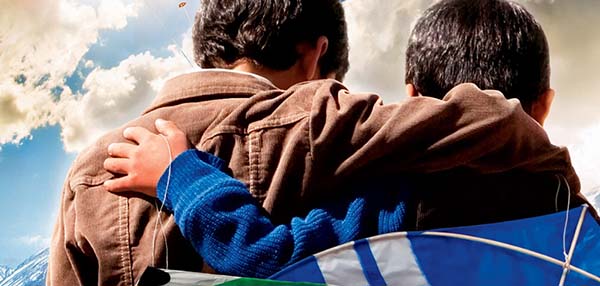Book (The Kite Runner) Review by Asad Kosha
Having won critique acclaim, best seller and to Isabel Allende "unforgettable" Khalid Hosseini's The Kite Runner, a tragic novel of man's lived life, who for the very first minute born experiences nothing but hatred in the world, with nostalgic longing to recuperate lost life and homeland is indeed a reminiscent to historical events of a country, where being Hassan is the unforgivable most social crime and metaphysical sin. This novel confesses the history of harsh oppression and brutalities imposed for centuries on large number of people. The writer makes Amir, the protagonist, acknowledge errors constantly committed by totalitarian authorities.
Hassan, who symbolizes the Hazara community as an isolated and deprived society ever since Afghanistan was founded to present day Afghanistan, is an innocent boy with extremely high sense of friendship, love and sacrifice, alert to safeguard and serve Amir to drop last blood drop he contains. In The Kite Runner Hosseini indicates a dreadful event Amir witnesses done to his only sibling Hassan, which for Amir brings regret of his silence and failure and the defense he could make but did not on Hassan's behalf. Hosseini vividly describes Afghanistan, both the privileged Afghanistan of Amir's and the horrible Afghanistan of Hassan's, which of Hassan inherits pain, cry, massacre and segregation but Amir school, wealth, university and subsequently flee to America.
Both motherless Amir and Hassan spend almost their childhood together, playing games, reading stories in their favorite place, albeit a son to affluent and well-off Pashtoon merchant, Amir wins this friendship when "in 1933, the year Baba was born and the year Zahir Shah began his forty-year reign of Afghanistan, two brothers, young men from a wealthy and reputable family in Kabul, got behind the wheel of their father's Ford roadster, high on hashish and mast on French wine, they struck and killed a Hazara husband and wife on the road to Paghman. The police brought the somewhat contrite young men and the dead couple's five-year old orphan boy before my grandfather, who was a high regarded judge and a man of impeccable reputation. After hearing the brother's account and their father plea for mercy, my grandfather ordered the two young men to go to Kadanhar at once and enlist in the army for one year-this despite the fact that their family had somehow managed to obtain them exceptions from the draft. Their father argued, but not too vehemently, and in the end, everyone agreed that punishment had been perhaps harsh but fair. As for the orphan, my grandfather adopted him into his own household, and told the other servants to tutor him, but to be kind to him. That boy was Ali", (P 21) Father to Hassan.
Ali turns orphan, this tragic event is the traumatic destiny of the whole group-the Hazaras- after losing self-right, in point of fact was convinced to slavery obligatory on them by chronic oppressive government, which brought Hassan's ancestors bond to turbulent life with no option but to endure hardship and adversity abiding age group after generation.
The Kite Runner to full extent can be a historic novel. It begins by the time Dawood Khan ousted Zahir Shah managing a coup d'état. How significantly history derives measures and attitudes and conversely how momentous stance shaping history is vividly described as history is not easy to overcome, eventually identifying them as Pashtoon, Hazara, Sunni and Shia', thus Hosseini, as observes, writes: "in the end I was a Pashtoon and he was Hazara, I was Suni and he was Shi'a, and nothing was ever going to change that. Nothing," (P, 22) is never forgotten point separated Hassan of Amir. Hassan whom for school, read-write and freedom is as not-known as for Amir his mother is, hence grows up illiterate "like Ali and most Hazaras had been that minute he had been born." (P, 24)
This novel, a "soul reaching" narrative with "unforgettable taste of trauma" is story of how human is affronted, snubbed and sodomized by human fellow- a horrific experience which a child touches through his broken soul when hearing acrimony- the soldier's vexation, a painfully avocation reminding the reader of those daily bases mock made unreservedly to each Hazara walking on Kabul streets. Although the Kite Runner is not a Shakespearean type of epic, describing Roman Kacewian class of tragedy, a novel of traumatic events when Hassan is sodomized during his childhood period by Assef, and when a woman is fired to dead in Ghazi Stadium under Taliban reign by mullah Omer dates back to those of Roman' novel picturesquely photographing the Jews, whose life is shattering, devastating and haunting in man history.
The plots combine both memory and nostalgia, memory of painfully Amir-made cowardice, betray and silence, nostalgia of innocence, friendship, love and homeland make shattering and inspiring story that stays with one for ever when they begin to read taking them to deep sorrow of life, inspiring redemption and Hassanesque sacrifices, with a message left to the reader, in particular the Afghan readers, "there is a way to be good again" (P,2) is a commitment that resonates throughout the novel, consequently after Amir acknowledges his "unatoned sins" tries to compensate it finding Hassan's only lost son of an orphanage and takes him to United States of America.
The Kite Runner, ultimately is to be viewed the "pain, passion" and cruel reality of daily life in Afghanistan, best penned by Hosseini's well-boned prose, which many critics call "enough contribution" to English literature albeit, it would be easy to comprehend Hosseini's almost no touch to whom really were behind the rapid Taliban spring up and other felonies that took place during 1990s, yet the KITE RUNNER is a vivid narrative to history.

